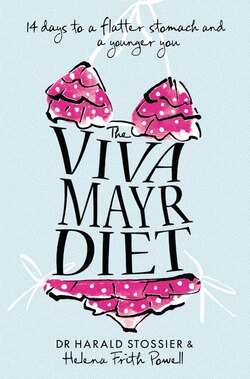Читать книгу The Viva Mayr Diet - Helena Frith Powell - Страница 10
Taking responsibility
ОглавлениеHealth is created by our own actions and efforts, and we are solely responsible for it. Of course, accidents happen for which we cannot be blamed, but on an everyday level, you choose how well you’re going to feel or how healthy you’re going to be. You know, for example, that drinking 14 Tequila Slammers is not going to make you feel good. But it’s your choice. Sometimes you just need those 14 Tequila Slammers (OK, maybe just a couple …).
The Greek philosopher Hippocrates noted that ‘health arises when we actively seek it’, and this premise is an important feature of the Viva Mayr philosophy, which defines the search for health as a positive thing. Health is quality of life in all its dimensions, which may vary from one individual to the next. We need to look at health as a natural and positive force that we each carry within us, and understand that it is within our own power to nurture. Quality of life as a parameter is attracting growing interest among scientists. There are even ‘how to be happy’ classes at Harvard University.
The word ‘diet’ comes from the ancient Greek term diaita. But, interestingly, this word didn’t mean to the Greeks what it does today; rather, it meant ‘way of life’ or ‘lifestyle’. In antiquity, living a health-conscious life was the obvious thing to do. This meant a disciplined approach to eating, including regular periods of fasting. Physical exercise and spirituality were also considered an important part of a healthy life. Diaita was far more than just a way to help people shed a few pounds, which is what the term ‘diet’ tends to mean now. This is also in keeping with the Viva Mayr approach to dieting. It is not a quick-fix to help you shed pounds (although it will do that), but an approach to adopt for life, to ensure that you not only stay thin, but also – more importantly – healthy.
Dr Mayr, the Austrian physician and Viva Mayr namesake, said: ‘Nutrition is the result of the food we eat and our digestive system.’ In other words, what matters is what we make of the food we eat.
When we eat a certain food – fish, meat, vegetable or potato – its nutrients do not go directly to the cells of our bodies. Our cells would not know how to make use of nutrients in this form. Instead, our digestive systems turn the food we eat into nutrients that our bodies can absorb and assimilate. Only then can we really make use of the energy and nutrients contained in food. Rather than saying ‘you are what you eat’, Dr Stossier and followers of Mayr would say ‘you are what you digest’.
I am really excited about this book. It will provide the logic that I and so many others have been looking for, and explain the essential principles behind a thinner, healthier life. My aim is to take Dr Stossier’s vast knowledge and expertise and present it to you in an easily digestible (pardon the pun) form of 14 main sections, set out as days of the plan. I will explain the reasons why it is so crucial that you overhaul your eating habits, and also how you can do so – easily and without too much pain, and for an enormous amount of gain.
Dr Stossier tells me that just by changing my eating habits I can put an end to my on-going digestive problems, lose weight, age better, feel better, sleep better, have more energy and clearer skin, concentrate on my work more effectively, and avoid major illnesses and disorders such as heart disease and asthma.
It seems a small price to pay for such a huge reward. I am keen to find out more.
